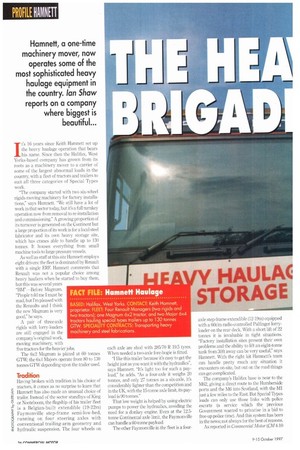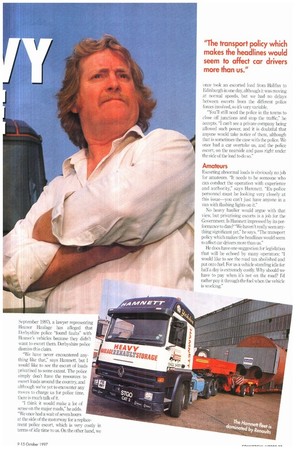PROFILE IIAMNETT Hamnett, a one-time machinery mover, now operates some
Page 38

Page 39

If you've noticed an error in this article please click here to report it so we can fix it.
of the most sophisticated heavy haulage equipment in the country. Ian Shaw reports on a company where biggest is beautiful...
It's 16 years since Keith Hamnett set up the heavy haulage operation that bears his name. Since then the Halifax, West Yorks-based company has grown from its roots as a machinery mover to a carrier of some of the largest abnormal loads in the country with a fleet of tractors and trailers to suit all three categories of Special Types work.
"The company started with two six-wheel rigids moving machinery for factory installations," says Hamnett. "We still have a lot of work in that sector today, but it's a full turnkey operation now from removal to re-installation and commissioning." A growing proportion of its turnover is generated on the Continent but a large proportion of its work is for a local steel fabricator and its own heavy storage site. which has cranes able to handle up to 130 tonnes. It houses everything from small machine tools to large pressure vessels.
As well as staff at this site Hamnett employs eight drivers: the fleet is dominated by Renault with a single ERE Hamnett comments that Renault was not a popular choice among heavy hauliers when he started to buy them, but this was several years "BM"—Before Magnum. "People told me I must be mad, but I'm pleased with the Renaults and I think the new Magnum is very good," he says.
A pair of three-axle rigids with lorry-loaders are still engaged in the company's original work, moving machinery, with five tractors for the heavier jobs.
The 6x2 Magnum is plated at 60 tonnes GTW; the 6x4 Majors operate from 80 to 130 tonnes GTW depending upon the trailer used.
Tradition
I laving broken with tradition in his choice of tractors, it comes as no surprise to learn that Hamnett has also made an unusual choice of trailer. Instead of the sector standbys of King or Nooteboom, the flagship of his trailer fleet is a Belgian-built extendible (19-22m) Faymonville step-frame semi-low-bed, running on four steering axles with conventional trailing-arm geometry and hydraulic suspension. The four wheels on
each axle are shod with 285/70 R 19.5 tyres. When needed a two-axle fore-bogie is fitted.
"I like this trailer because it's easy to get the height just as you want it with the hydraulics", says Hamnett. "It's light too for such a payload," he adds. "As a four-axle it weighs 20 tonnes, and only 27 tonnes as a six-axle, it's considerably lighter than the competition and in the UK, with the 15-tonne axle limit, its payload is 90 tonnes."
That low weight is helped by using electric pumps to power the hydraulics, avoiding the need for a donkey engine. Even at the 12.5tonne Continental axle limit, the Faymonville can handle a 60-tonne payload.
The other Faymonville in the fleet is a four
axle step-frame. extendible (12-19m) equipped with a 661/rn radio-controlled Palfinger lorryloader on the rear deck. With a short lift of 22 tonnes it is invaluable in tight situations. "Factory installation sites present their own problems and the ability to lift an eight-tonne tank from 30ft away can be very useful," says Hamnett. With the right kit Hamnett's team can handle pretty much any situation it encounters on-site, but out on the road things can get complicated.
The company's Halifax base is near to the M62, giving a direct route to the Humberside ports and the M6 into Scotland, with the M1 just a few miles to the East. But Special Types loads can only use those links with police escorts (a service which the previous Government wanted to privatise in a bid to free-up police time). And this system has been in the news; not always for the best of reasons.
As reported in Commercial Motor (CM 4-10
September 1997), a lawyer representing Heanor Haulage has alleged that Derbyshire police "found faults" with Heanor's vehicles because they didn't want to escort them. Derbyshire police dismiss this claim.
"We have never encountered anything like that," says Hamnett, but I would like to see the escort of loads privatised to some extent. The police simply don't have the resources to escort loads around the country, and although we've yet to encounter any moves to charge us for police time, there is much talk of it.
"I think it would make a lot of sense on the major roads," he adds "We once had a wait of seven hours at the side of the motorway for a replacement police escort, which is very costly in terms of idle time to us. On the other hand, we once took an escorted load from Halifax to Edinburgh in one day, although it was moving at normal speeds, but we had no delays between escorts from the different police forces involved, so it's very variable.
"You'll still need the police in the towns to close off junctions and stop the traffic," he accepts. "I can't see a private company being allowed such power, and it is doubtful that anyone would take notice of them, although that is sometimes the case with the police. We once had a car overtake us, and the police escort, on the nearside and pass right under the side of the load to do so."
Amateurs
Escorting abnormal loads is obviously no job for amateurs. "It needs to be someone who can conduct the operation with experience and authority," says Hamnett. "Ex-police personnel must be looking very closely at this issue—you can't just have anyone in a van with flashing lights on it."
No heavy haulier would argue with that view, but privatising escorts is a job for the Government. Is Hamnett impressed by its performance to date? "We haven't really seen anything significant yet," he says. "The transport policy which makes the headlines would seem to affect car drivers more than us."
He does have one suggestion for legislation that will be echoed by many operators: "I would like to see the road tax abolished and put onto fuel. For us a vehicle standing idle for half a day is extremely costly, Why should we have to pay when it's not on the road? I'd rather pay it through the fuel when the vehicle is working."








































































































